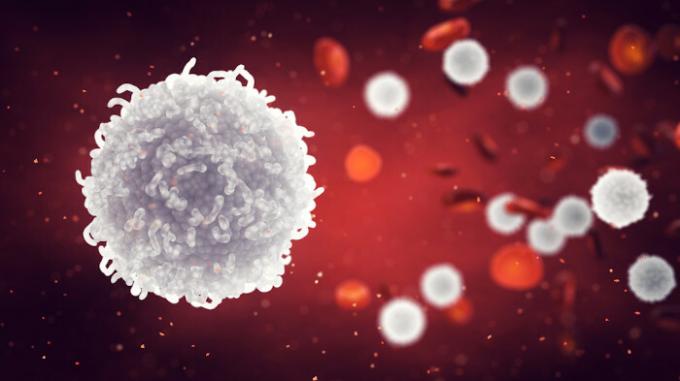O immune system, also known as the immune system or immune system, is a system that acts on our body ensuring protection against foreign elements such as disease-causing agents. It is composed of molecules, cells, tissues and organs that, together, act to promote the defense of our organism.
The immune system is able to recognize a threat, generate a response against it and also quickly recognize it if it tries to act against our body again. It is therefore a very effective defense system.
Read more: Vaccination - through it, the body is stimulated to protect itself from certain diseases
Immune system summary
The immune system works to defend our body.
Two of its most striking features are its specificity and memory capacity.
Memory capacity is directly related to the efficiency of vaccines.
Leukocytes, also known as white blood cells, are blood cells responsible for the defense of our body.
Antibodies are produced by plasma cells and specifically interact with the antigen that stimulated their production.
Immune system video
Immune or immune system
The immune system, also known as the immune system or immune system, is our body's system. responsible for defending the body against foreign substances and disease-causing agents, including cancer cells. It consists of different cells, fabrics, organs and molecules that, together, form a great protection network.
Two important features of the immune system are specificity and memory. Specificity concerns the ability of this system to recognize and generate responses against certain foreign elements in our body. Memory is the ability of the immune system to recognize a threat that has already come into contact with our body before. Memory is therefore responsible for the long-term protection of our body.
Memory capacity is directly related to the vaccine efficiency. The vaccine is produced based on the disease-causing agents themselves, using them killed, attenuated or even fragmented. The vaccine allows the disease-causing agent to be identified and the body to be able to quickly fight it off when it tries to invade it in the future.
Components of the immune system
The immune system is made up of cells, tissues, organs and molecules that work in a coordinated manner to ensure the recognition and destruction or neutralization of disease-causing substances and agents. In this system there are free cells, such as leukocytes, and individualized structures, such as the spleen and lymph nodes.
leukocytes

Leukocytes, also known as white blood cells, are blood cells responsible for the defense of our body. These cells are produced in bone marrow and migrate to various parts of the body.
the leukocytes can be divided into two groups: granulocytes and agranulocytes. You granulocytes include neutrophils, eosinophils, and basophils, while agranulocytes include lymphocytes and monocytes.
You neutrophils are leukocytes that carry out phagocytosis (engulfment of particles) of foreign particles. You eosinophils, in turn, are more related to processes allergic and infections parasitic. already the basophils they act in allergic processes and promote the release of heparin (an anticoagulant substance) in the blood.
You monocytes are leukocytes that also carry out phagocytosis. You lymphocytes can be divided into B lymphocytes and T lymphocytes. B lymphocytes stand out for differentiating into plasma cells and being able to produce antibodies. T lymphocytes divide into CD8 and CD4. CD8 T lymphocytes destroy infected cells, while CD4 cells act by activating other cells, such as B lymphocytes. If you want to know more about the topic of this subtopic, read: leukocytes.
antibodies
When we talk about the immune system, we cannot fail to mention antibodies, substances also known as immunoglobulins, produced by plasma cells. Antibodies can be defined asproteins that specifically interact with the antigen that stimulated their production. By antigen is meant the molecule that is capable of binding an antibody.

the antibodies can act in different ways when interactingin with an antigen. One of these ways is to bind to it preventing it from infecting or destroying other cells. The antibody can also cause the antigen to be recognized by neutrophils or macrophages that will act by performing phagocytosis. It can also trigger the so-called complement system, which will trigger the lysis (rupture of the cell) of the invading organism. If you want to delve deeper into the topic, read our text: antibodies.
autoimmune diseases
As we have seen throughout the text, our body has a complex system capable of guaranteeing the organism's defense against invading agents and foreign elements. In some situations, however, the immune system can recognize our own cells as foreign bodies and attack them, thus triggering autoimmune diseases. Examples of autoimmune diseases are rheumatoid arthritis, Hashimoto's thyroiditis, Graves' disease and diabetes type I.
How to strengthen the immune system?
The immune system is essential to protect our body against diseases, therefore it is essential for it to function efficiently. For it to function properly, it is essential to maintain a healthy eating, investing, for example, in less processed foods and in the consumption of more natural foods, such as fruits and vegetables; practice physical exercises regularly; take good care of sleep; avoid the consumption of cigarettes and alcohol; and reduce stress.


